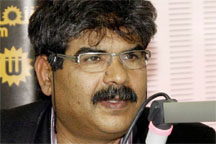TUNIS, (Reuters) – Tunisian opposition politician Mohamed Brahmi was shot dead yesterday in the second such assassination this year, setting off violent protests against the Islamist-led government in the capital and elsewhere.

“This criminal gang has killed the free voice of Brahmi,” his widow, Mbarka Brahmi, told Reuters, without specifying who she thought was behind the shooting outside their home in Tunis.
Brahmi’s sister later accused the main Islamist Ennahda party of being behind the killing. “Ennahda killed my brother,” Souhiba Brahmi said. Ennahda has condemned the killing.
The politician’s wife said Brahmi had left the house after receiving a telephone call. She heard shots and found his body lying on the ground outside as two men fled on a motorcycle.
Brahmi belonged to the secular, Arab nationalist Popular Front party, whose then-leader, Chokri Belaid, was killed in a similar way on Feb. 6. His death ignited the worst violence in Tunisia since President Zine al-Abidine Ben Ali fell in 2011.
Divisions between Islamists and their secular opponents have deepened since the popular uprising against Ben Ali, which unleashed unrest across the Arab world, unseating rulers in Egypt, Libya and Yemen, and leading to a civil war in Syria.
Brahmi, 58, was a critic of the Ennahda-led ruling coalition and a member of the Constituent Assembly that has drafted a new constitution for the North African nation of 11 million.
The assassination drew swift international condemnation.
The U.S. State Department called for a “transparent and professional” investigation, while French President Francois Hollande urged Tunisians to show “the necessary spirit of responsibility to preserve national unity and guarantee the pursuit of the democratic transition”.
U.N. human rights chief Navi Pillay called for the killers to be brought to account and said the government must do more to “deter these terrible acts” and protect people at risk.
Thousands of people protested outside the Interior Ministry in Tunis and a hospital in the Ariana district where Brahmi’s body had been taken. “Down with the rule of the Islamists,” they chanted, and demanded that the government resign.
Big crowds accompanied Brahmi’s body when it was taken later for autopsy at another Tunis hospital. Despite the presence of hundreds of soldiers and police, protesters smashed cars and broke some windows of the hospital in Ariana, witnesses said.
In Tunis, riot police fired teargas in front of the Interior Ministry to try to disperse protesters, a Reuters witness said.
Similar demonstrations erupted in the southern town of Sidi Bouzid, the cradle of the Tunisian revolution, where protesters set fire to two local Ennahda party offices, witnesses said.
“Thousands have taken to the streets. People have blocked roads and set tyres alight,” said Mehdi Horchani, a resident of Sidi Bouzid. “People are very angry.”
Police fired teargas to disperse protesters who stormed a local government office in the Mediterranean port of Sfax, 270 km (170 miles) southeast of Tunis, witnesses said.
Tunisia’s biggest labour organisation, UGTT, called for a general strike on Friday to protest Brahmi’s killing. Its secretary-general, Hussein Abbasi, earlier predicted that the assassination would lead the country into a “bloodbath”.
